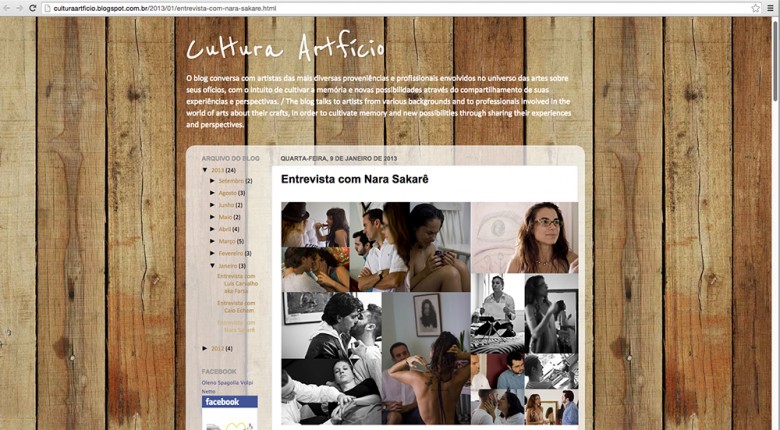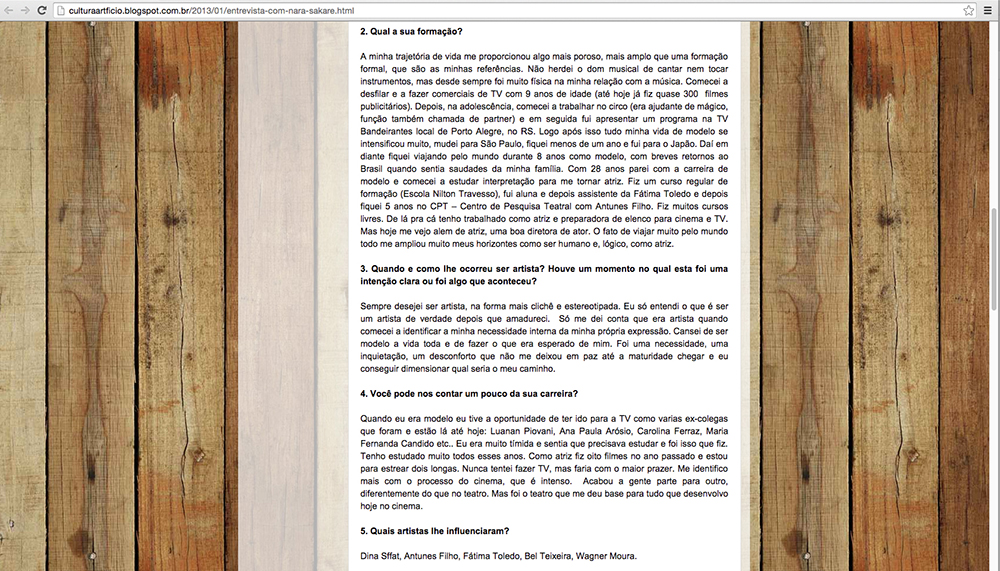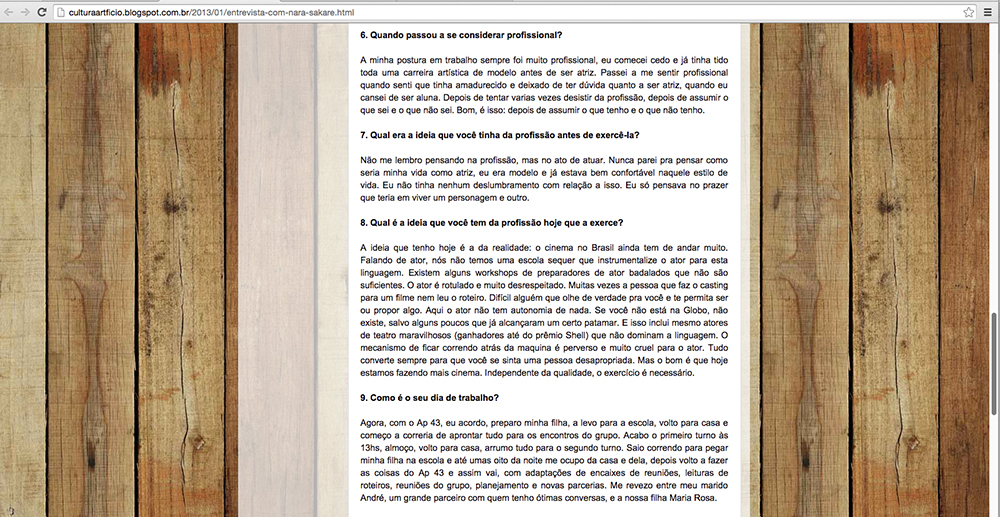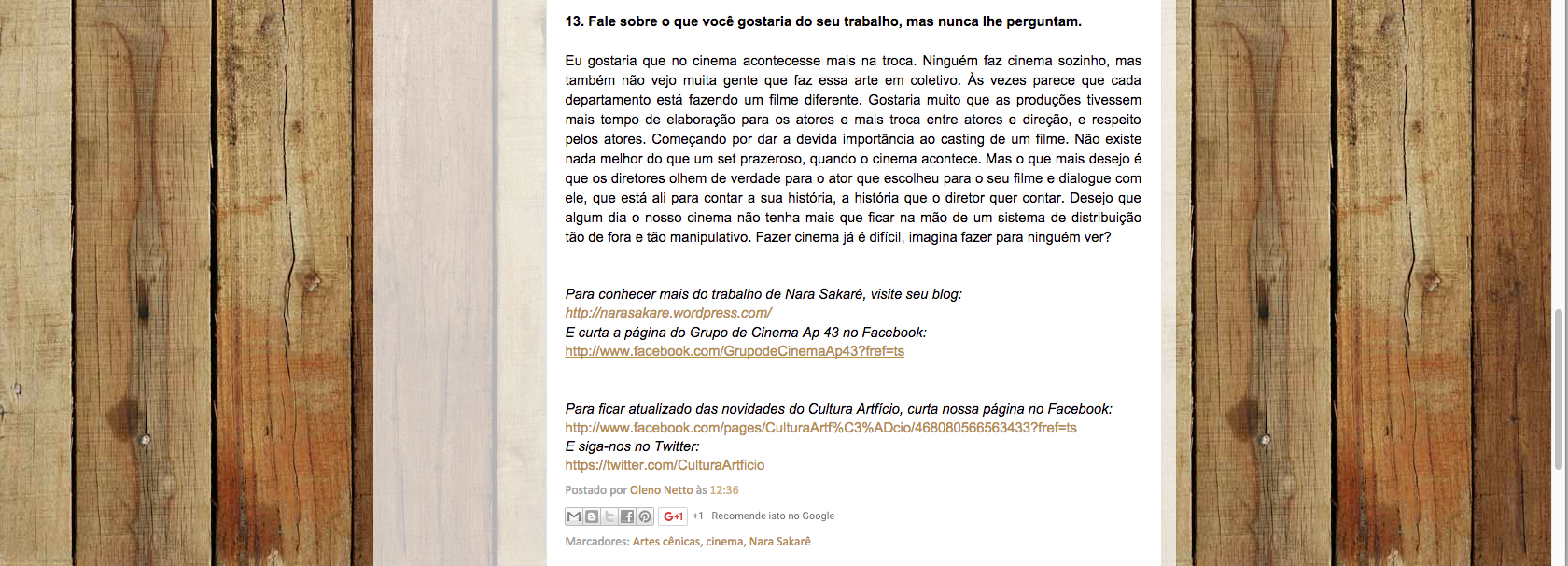Interview with Nara Sakarê for the blog Cultura do Artíficio
The creator and executive director of AP43, Nara Sakarê, gave an interview for the blog Cultura do Artifício, of Oleno Netto, where she talks about her research process at AP43 and her career.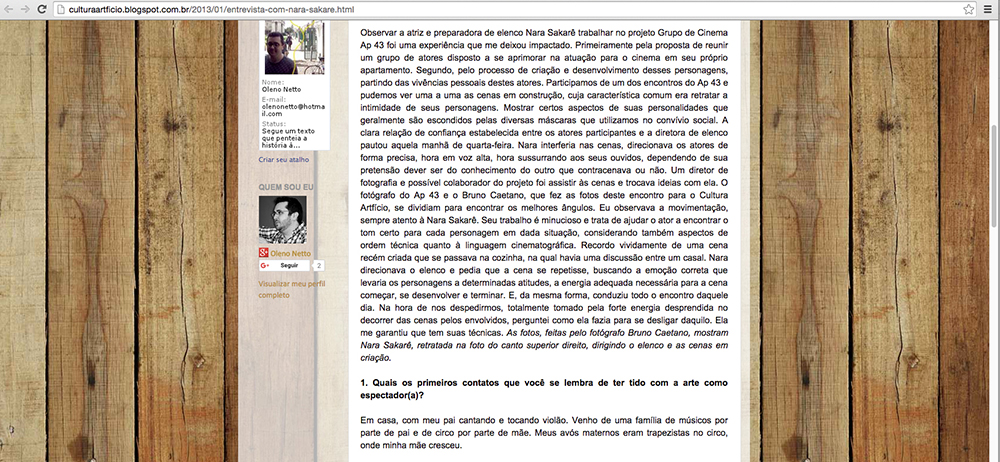
Observe the actress and casting coach Nara Sakarê work on the project Film Group Ap 43 was an experience that got me impressed. First, due to the proposal to bring together a group of actors willing to improve on acting for movies, in her own apartment. Second, due to the design and development of the creative process of these characters, based on the personal experiences of these actors. We participate in one of the Ap 43 meetings and we could see, one by one, the scenes in construction whose common feature was to portray the intimacy of his characters.
To show certain aspects of their personalities that are usually hidden by several shades we use in social life. The clear relationship of trust established between the participating actors and the casting director guided that Wednesday morning. Nara interfered in the scenes, directing the actors precisely, sometime aloud, sometime whispering in their ears, depending on her intention whether the other actor should be or not aware of it. A photography director and possibly future collaborator on the project was also there, to watch the scenes and exchanging ideas with Nara.
AP.43 photographer and Bruno Caetano, who took the photos of this meeting for the Cultura Artfício, shared the space to find the best angles. I watched the movements, always attentive to Nara Sakarê. Her work is meticulous and comes to helping the actor to find the right tone for each character in a given situation, also considering technical aspects regarding the cinematographic language. I remember vividly a newly created scene that was happening in the kitchen, where there was an argument between a couple. Nara directed the cast and asked them to repeat the scene, searching for the right emotion that would lead the characters to certain attitudes, the proper energy to start the scene, and develop it up to the end. And, likewise, she led throughout all the meeting that day.
By the time to say goodbye, totally taken by the strong energy given off during the scenes by those involved, I asked how could she get disconnected from it. She assured me that she has ‘her techniques’. The photos, taken by photographer Bruno Caetano show Nara Sakarê, pictured in the photo top right, directing the cast, and scenes in creation.
- What are the first contacts you remember having had with art as a spectator?
At home, with my dad singing and playing guitar. I come from a musical family on my father’s side, and from circus by my mother’s side. My maternal grandparents were trapeze artists in the circus, where my mother grew up.
- What is your background?
My life path has given me something broader than formal training, who are my references. It was not my heritage the gift of music to sing or play instruments, but ever since I was always very physical in my relationship with music. I began to modeling and to do TV commercials when I was 9 years old (to date I have made nearly 300 advertising films). Then, as a teenager, I started working in the circus (as the illusionist assistant, a function also called partner) and then I presented a program on TV Bandeirantes location of Porto Alegre, RS. Soon after this all my life as a model has intensified a lot, I moved to São Paulo, and then in less than a year I went to Japan. From then on I was travelling the world for 8 years as a model, with brief returns to Brazil, when I really missed my family. At 28 I stopped with the modeling career and began to study acting, to become an actress. I made a regular training course (Nilton Travesso School), I was a student and then after became assistant to Fatima Toledo, and then I was five years in the CPT – Theatrical Research Center with Antunes Filho. I made many free courses. Since then I have worked as an actress and a cast coach for the cinema and TV. But today I find myself beyond actress, a good actor’s director. The fact that I travelled a lot around the world broadened my horizons so much as a human being and, of course, as an actress.
- When and how did you come to be an artist? There was a time when this was a clear intention or was it something that just happened?
I always wanted to be an artist, in the most clichéd and stereotypical way. I just understood what means to be a real artist once I matured. I just realized I was an artist when I began to identify my inner need of having my own expression. I was tired of being a model all my life and to do what was expected from me. It was a need, an uneasiness, a discomfort that did not leave me alone until maturity arrived and I could design which would be my way.
- Can you tell us a little about your career?
When I was a model I had the opportunity to have gone to the TV as several former colleagues who have been and are still there today: Luanan Piovani, Ana Paula Arósio, Carolina Ferraz, Maria Fernanda Candido etc .. I was very shy and felt that I needed to study and that’s what I did. I have extensively studied all these years. As an actress I took part in eight films in the past year and I am to premiere two films. I never tried to do TV, but would be happy to do. I feel myself more identified with the cinema process, which is intense. Finishing one, and we just leave to another, differently than in the theater. But it was the theater that gave me the basis for everything I develop today in cinema.
- What artists influenced you?
Dina Sfat, Antunes Filho, Fatima Toledo, Bel Teixeira, Wagner Moura.
- When did you come to consider yourself as a professional?
My attitude has always been very professional at work; I started early and I had already had an entire artistic career of model before becoming an actress. I started to feel professional when I felt I had matured and ceased to doubt about being an actress, when I got tired of being a student. After trying several times to give up the profession, after realizing what I know and what I do not know. Well, it’s this: after realizing what I have and what I have not.
- What was the idea that you had about the profession before you exercise it?
I do not remember of thinking about the profession, but thinking of the moment of acting. I never stopped to think how my life as an actress would be, I was a model and I already was pretty comfortable in that lifestyle. I had no glamour about it. I only thought about the pleasure that would be performing as a character and another.
- What is the idea that today you have of the profession you work on?
The idea I have now is the reality: cinema in Brazil still have to walk far. Speaking about the actors, we do not have a school that even give the actor the appropriate instruments within this language. There are some workshops of trendy trainers but that is not enough. The actor is labeled and disrespected. Often the person responsible for the casting for a movie haven’t even read the script. It’s rare to find someone who gives you a real look, and let you be or propose something. Usually, the actor has no autonomy at all. If you are not in Globo TV, you do not exist, except for some few who have reached a certain level. And that includes even wonderful theater actors (even the Shell Prize winners) who do not master the language. The mechanism to be running after the machine is wicked and cruel for the actor. Everything always makes you feel an inappropriate person. But the good thing is that we are now making more movies. Regardless of quality, exercise is necessary.
- How is your typical working day?
Now, with AP.43, I wake up, I prepare my daughter, take her to school, come home and start the rush to get everything ready for the group meetings. Just after finishing the first round by 1pm, I have lunch, come home to prepare everything to the second round. I run to pick up my daughter at school and up to 8pm I take care of the house and of her, then I go back to take care of Ap 43 and so on, with adaptations of meeting plugins, script readings, group meetings, planning and contacts to build up new partnerships. I share my time with my husband André, a great partner with whom I have great conversations, and our daughter, Maria Rosa.
- Has your work been benefited from the internet and social networks?
Very much! I do everything on the Internet. I have a blog where I record the entire contents of our process. I have a Facebook group that is our daily communication system, and I have another page that it is our job disseminating window. Soon we will have some teaser dissemination actions of Ap43 pumping out there on the internet.
- Can you pay the bills with art as a craft? How do you do?
Being an actor is an option that you do in life and one should be aware that it comes with a package, that implies maybe you do not have a lot of comfort and have to go through some troubles. And that’s real. I’ve gone through many, many hassles. Usually people have another sideline (that so called ‘Option B’), and today I am very happy to be able to live from what I love more. Ap 43 gives me structure to make art and at least have a decent life. But I have gone through many afflictions to imagine I would have to do something I do not like to make money. I have a daughter to raise. I’ve been hostess, I have worked with the production of shows and as artistic agent, and also worked as translator and interpreter.
- How do you believe will be the future of your profession?
Just as it has been in recent years: with little autonomy, for the few … and with little preparation for the language of cinema.
- Talk about what you would like to tell of your work, but you never been asked.
I would like that movies happen more mutually. Nobody makes movies alone, but also I do not see many people who make this art collective. Sometimes it seems that every department is making a different movie. I would love that the productions would have more preparation time for the actors, more exchange between actors and direction, and respect for actors. Starting by giving the due importance to the casting of a film. There is nothing better than a pleasant set, when the film takes place. But what I do hope is that the directors really look for the actor chosen for his film and dialogue with him, who is there to tell his story, the story that the director wants to tell. I wish that someday our movies no longer have to stay in the hands of a distribution system so apart and so manipulative. Film making is difficult, imagine doing it for anyone to see?

